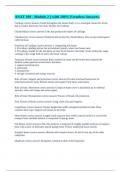Exam (elaborations)
ANAT 100 - Module 2 || with 100% Errorless Answers.
- Course
- Institution
Cartilage correct answers Found throughout the human body, it is a semirigid connective tissue that is weaker than bone, but more flexible and resilient. Chondroblasts correct answers Cells that produce the matrix of cartilage. Chondrocytes correct answers Produced and secreted by chondroblas...
[Show more]



